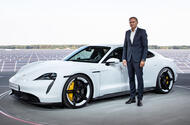Blume approved the Taycan EV for production in his first board meeting as Porsche CEO
After Taycan sales dropped 49% and China demand by 28%, Porsche must make key decisions to reverse the slump
A year ago, Oliver Blume lauded his decision to approve the Taycan electric saloon for production at his first ever supervisory board meeting as Porsche CEO back in 2015.
“We were talking about billions in investment. It required a lot of courage,” he recalled.
A decade after that meeting, however, Porsche is having to backtrack on its electric ambitions after a grim year: Taycan sales plummeted 49%, demand in China fell 28% and the company’s share price tumbled 53% from its 2023 peak.
The fallout has pushed Porsche to the brink of a major leadership overhaul. The company recently made the unusual announcement that the contracts of deputy chairman and chief financial officer Lutz Meschke and sales and marketing director Detlev von Platen could be terminated. The pair were blamed for the company’s downturn and a faltering share price.
Whether other top managers are being targeted remains unclear, but Blume’s dual role as both Porsche CEO and overall Volkswagen Group CEO is one being questioned by investors.
In response, Porsche recently announced that it would spend an additional €800 million (£666.2m) in 2025 partly to “expand the product portfolio to include additional vehicle models with combustion engines or plug-in hybrids”.
Some of that money could go towards extending the life of the ICE Macan SUV and reversing the original plan to retire it globally in favour of the all-new Macan Electric, Porsche insiders have told Autocar.
The company is still expected to launch the Cayenne Electric SUV later this year or in early 2026 to sell alongside its best-selling and newly updated ICE Cayenne.
But the electric 718 Boxster and Cayman sports cars due for launch this year could be delayed amid teething problems, while the planned ‘K1’ large electric SUV to sit above the Cayenne faces an even more uncertain future.
Porsche’s woes are both internal and external.
Externally, the company has been hit by the wider luxury slowdown in China, to the point that executives have admitted they need to permanently shrink the dealer network and sales organisation there. China’s economy is partly to blame, but so too is the sheer strength of the local competition, particularly on EVs.
Meanwhile, the US is poised to backtrack on EVs after the return of climate-change sceptic Donald Trump to the presidency, giving a longer glide path to ICE cars.
With the US now Porsche’s strongest market, making up 28% of the company’s total sales of 310,718 last year, and China shrinking from a quarter in 2023 to just 18%, the centre of gravity has moved more towards ICE cars – at least outside of Europe.
The internal problems are mainly Taycan-related, after owners suffered a series of issues, most seriously the ARB5 and ARB6 recalls to rectify “a short circuit within the battery modules” after instances of cars catching fire during charging.
Some owners have taken to online forums to complain of being told to restrict charging to 80% of the battery limit.
Porsche then carried out a root-and-branch overhaul of the Taycan but the updated model was hit by “a slower than planned ramp-up” last year, hurting sales, the company said in February.
Porsche is hopeful of a recovery, though. “It’s a situation which is not satisfying, because the Taycan is fantastic car,” Meschke said in October.
Early sales of the Macan Electric, meanwhile, are promising. Last year, Porsche sold 18,278 examples, putting it only just behind the Taycan, despite sales having started in the middle of the year. In the UK, it was the 10th best-selling EV in January, according to the SMMT.
The progress of Porsche’s 2025 reset is being closely monitored by analysts and investors, who have had to watch glumly as the company’s shares first jumped and then collapsed in value since listing in September 2022.
The whole idea of floating Porsche separately from the Volkswagen Group was to create this Ferrari-chasing profit machine, valued more as a luxury brand than a car company. So far, it hasn’t worked out.
“A premium multiple requires premium execution,” Deutsche Bank analyst Tim Rokossa wrote in note after Porsche informed investors that 2025 was going to be a lot tougher than thought. “This is P911’s [Porsche’s] last shot to prove they can turn around this business before losing more trust of long-term shareholders.”
Porsche could use this moment to halt its global expansion, which has tripled annual sales from just under 100,000 back in 2010, and “re-emphasise value over volumes”, according to Berenberg bank analyst Romain Gourvil.
The 911 has long been the mainstay of Porsche’s profits. This year, the 992 version is moving into its second phase, including the first hybrid version. The company retreating back into the security of the 911 fortification to wait for the global chaos outside to subside would be understandable.
Porsche once again has to make a decision of similar courage to the one it made 10 years ago and hope that future circumstances are kinder to it than they were in 2024 – a year to forget.


